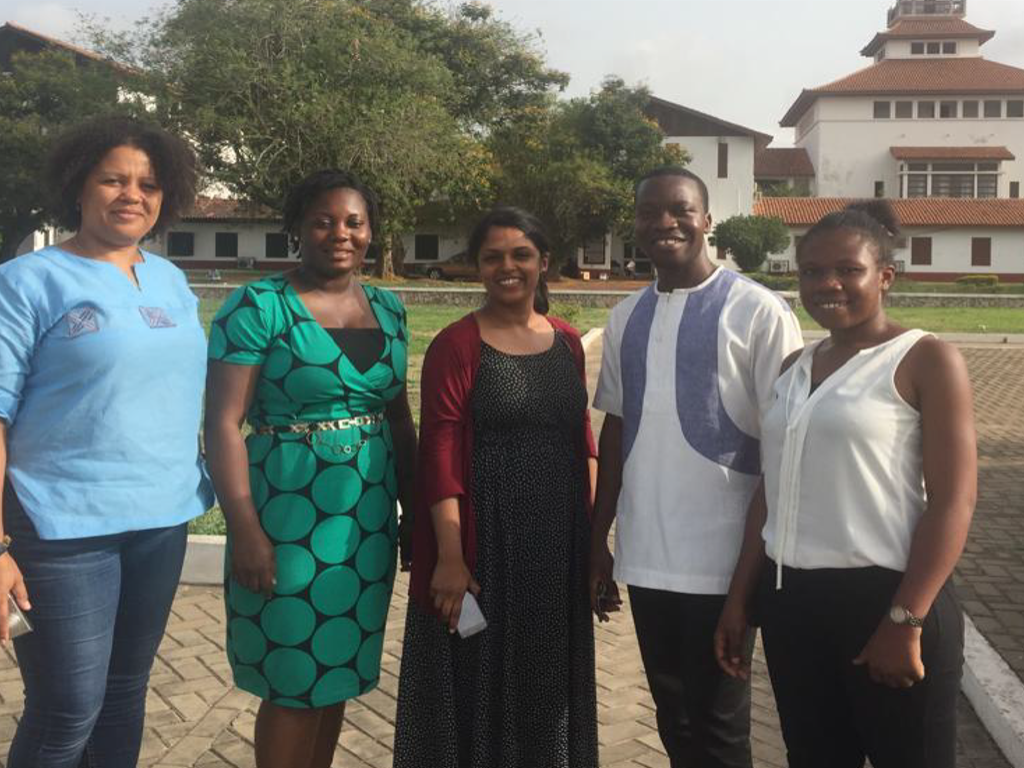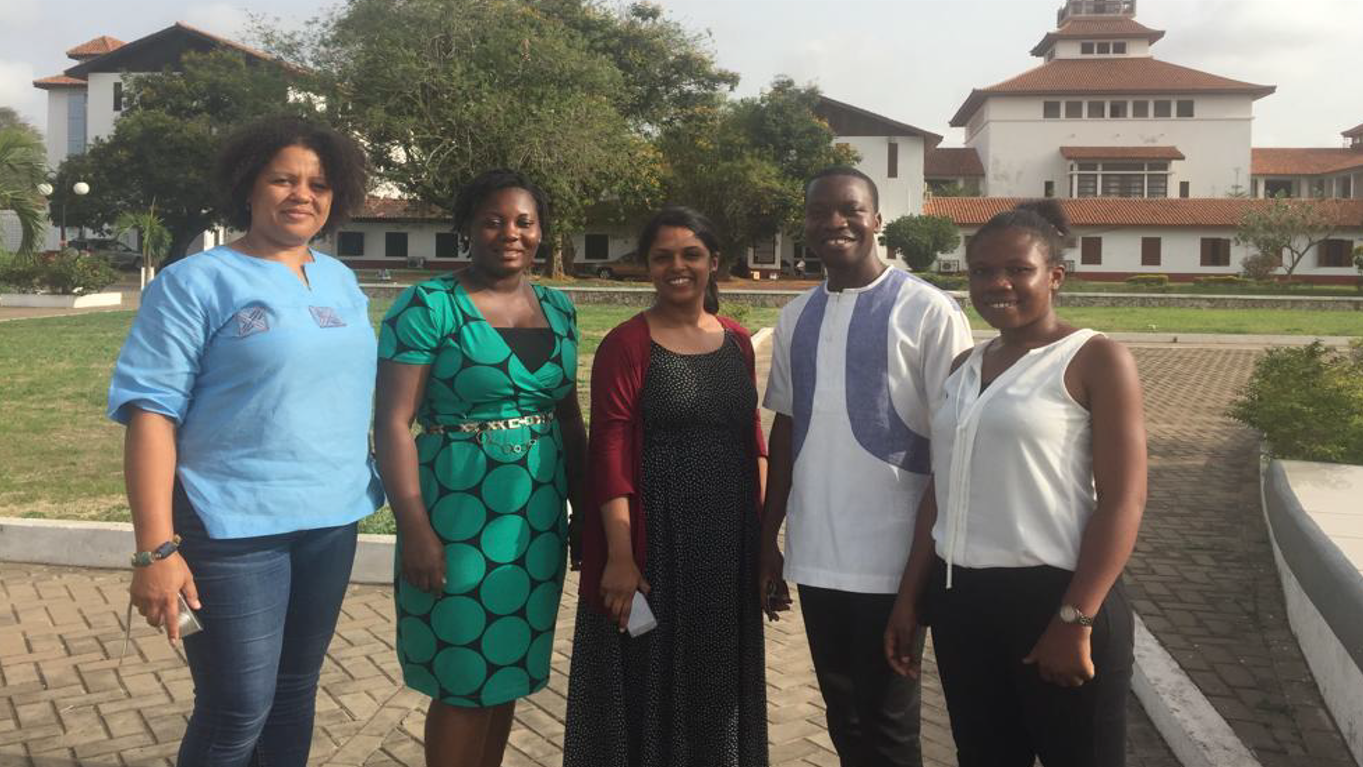Synthesising familiarity and difference: Doing research in post-colonial landscapes

By Natasha S.K.
I travelled to Accra, Ghana in March 2018 as part of my small opportunities grant (SOG) project to meet with and interview students, faculty and staff working on the theme of social differentiation and gender in climate change adaptation. I met with past and current students working on different themes under the ASSAR banner. While I largely spoke with social science students, I also spoke with one ecologist who brought in a very different perspective on livelihood changes and practices. While very grateful to the students for their insights, I was concerned about the trouble I had caused them, most of whom travelled from very far with little sleep or rest!
This work was continued at the ASSAR Annual Meeting in June 2018, where I met with and spoke with the same members of the team to follow up on emerging insights, as well as to connect with and interview a student I had not been able to meet with when I was in Accra. Sessions conducted at the annual meeting also brought to light new insights as faculty like Chris Gordon and Adelina Mensah spoke of livelihood practices in Ghana that were spatially different.
The synthesis of the Ghana student projects offers insights into how coping practices in the Upper West Region of Ghana vary across micro-regions, age categories, landholding categories and gender. Variation in these findings across sites in Ghana indicate that no one kind of categorisation signifies vulnerability or adaptive capacity. Instead, there is an analytical need to unpack how place, identity, and other forms of differentiation shape livelihood practices. For ASSAR, this means privileging heterogeneity in public communications, as well as in the design of development practice.
The SOG grant not only gave me the opportunity to study a region that I was until-recently unfamiliar with, both academically and personally, but it offered me the chance to look at familiar agricultural and livelihood practices through a very different perspective than that is common in India. This allowed me to view existing themes through a new lens, or rather multiple lenses offered by the team at the University of Ghana as well as the students I met with who come from very different backgrounds.

Reflections
When I first discussed applying for an ASSAR SOG to work with the team at the University of Ghana with Amir Bazaz, I was primarily excited about the chance to engage in a “South-South” collaboration of sorts. Southern researchers are often under-represented or overlooked in academic scholarship outside their circles. ASSAR’s framing to include Southern institutions across regions of Asia and Africa makes it uniquely placed to challenge some of these divides. The challenge, as I saw it, was to make sense of the livelihood trajectories of two very different countries (India and Ghana), where I first began looking at the theme of social differentiation and gender in climate change adaptation, with the generous help of the ASSAR faculty and staff at the University of Ghana.
My first sense of what this exercise could look like was the first few hours I spent at Denmark House where I was given a room to stay at, followed by the next few days on campus. Denmark House was a convenient location to stay at, on campus, and a half an hour walk from the buildings in which I would meet people. It also offered a peaceful break from the tempo of research and my life back in India, and jetlag ensured that I spent many mornings on the porch sipping coffee and/or fruit yoghurt as the sun came up and the campus came to life. When I shared pictures of the campus and Denmark House itself with family and friends back home, everyone – like me – was struck by how familiar the landscape looked and felt, an impression that has been shared by friends who have visited different parts of the world and who have wondered if they had stepped into an alternate Indian (in my case Bombay) universe. Of course with similar or overlapping colonial histories and the consequent built environments (merged as they are with newer, local structures) this is not unusual, but I experienced a persistent feeling of being in a place that in some ways I already knew.
This sense of familiarity-and-yet-difference continued in my academic and personal conversations with my hosts Adelina Mensah, Rahinatu Sidiki Alare, Prosper Adiki, Wendy, and Prince Ansah, as well as the students who have been a part of ASSAR. Not only did I come to learn more about how livelihood practices are changing in the Upper West Region of Ghana where most of the research is conducted, I also came to slowly get a sense of Accra – whether it was from (to my great delight) eating fried plantain similar to what I enjoyed in my mother’s kitchen, discussing where I might buy batik material, or talking about the university itself with its unique built form, and surprisingly Japanese influences (see the picture above). But the more time I spent there – even if that time was just six days! – the more I came to appreciate how easy it was to see Accra as another version of India, when in fact as it slowly revealed itself to my curious eye it came alive as a city with a particular rhythm, history, sounds, flavours, practices and people.
These visceral experiences of familiar-yet-not-identical were perhaps helpful in the beginning to imagine what a synthesised understanding of situated yet linked phenomena in the climate adaptation space might look like. In my on-going work on synthesising the research of researchers from different parts of ASSAR, I have struggled with coalescing the practices of people with vastly different histories and locations into a coherent story with a message that might be useful for all. Through this journey from sipping Savanna in Jamestown, Accra to drinking filter coffee in Bangalore, I have learnt to privilege these differences and look for learnings in the spaces between them.